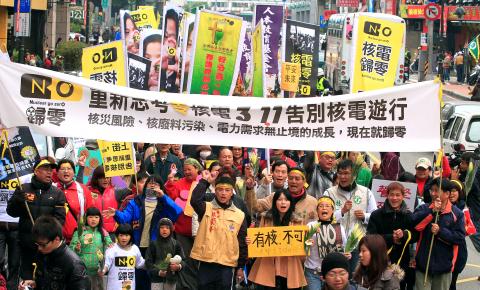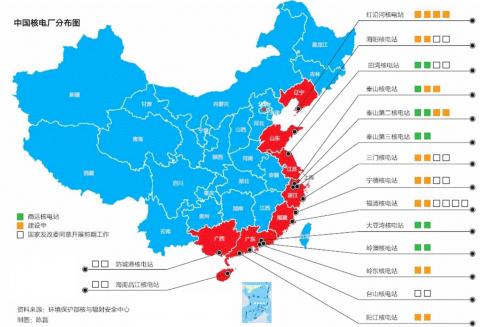Thousands of opponents of nuclear energy from across the nation paraded in the streets of Taipei yesterday to mark the first anniversary of the March 11 earthquake and tsunami in Japan, which crippled the Fukushima Dai-ichi nuclear power plant.
“Nuclear go zero — rethink nuclear power” was the main theme of the protest, during which participants urged the public to consider the risks posed by a nuclear disaster, nuclear waste contamination and unlimited demand for electricity.
At 1:46pm (2:46pm in Japan, when the earthquake struck), the crowd held a minute of silence for the victims of the disaster before moving from Longshan Temple MRT Station.

Photo: CNA
Organizers estimated that more than 5,000 people and more than 100 NGOs took part in the rally.
With processional troupes from religious groups leading the parade, protesters held yellow balloons with anti-nuclear slogans, banged on African drums while shouting battle cries and held green paper windmills symbolizing “green” energy as they marched through the streets.
Participants from the Humanistic Education Foundation held black and white portraits of themselves, similar to those used in funeral processions, saying there would be no tomorrow if a nuclear disaster occurred.

Photo: Lin Chia-chi, Taipei Times
“Many people think that the possibility of a nuclear disaster is a distant one ... but actually the Jinshan Nuclear Power Plant [in Shihmen District (石門), New Taipei City (新北市)] and the Guosheng Nuclear Power Plant [in New Taipei City’s Wanli District (萬里)] are less than 30km away from us, and the Fourth Nuclear Power Plant [in New Taipei City’s Gongliao District (貢寮)] is only 40km away from the Presidential Office,” Taiwan Environmental Protection Union secretary-general Lee Cho-han (李卓翰) said.
“We are protesting today for the children of today and tomorrow,” Lee said.
A special feature of the parade was the participation of Tao Aborigines from Lanyu, who oppose the dumping of nuclear waste on the island by Taiwan Power Co (Taipower).
“Against nuclear waste, save Lanyu. Against nuclear power, save Taiwan,” the residents of Lanyu shouted, with several people in traditional dress and occasionally performing a ritual to drive evil spirits (nuclear waste) away by shouting in a low-pitched voice.
Sinan Mavivo, an anti-nuclear activist and resident of Lanyu, said that for the past 30 years the children of Lanyu had grown up under the threat of nuclear waste in their homeland, while many people on the island have been diagnosed with cancer that has very likely been caused by radiation from the waste.
“A researcher at Academia Sinica last year confirmed there was radioactive leakage near the nuclear waste storage [facility] on the island,” she said. “But Taipower keeps trying to cover-up the fact and lies about the danger.”
Residents of the island urged the government to remove the nuclear waste immediately to protect their health and suggested that health check-ups be provided for residents.
“If we don’t stop nuclear power today, tomorrow our tears will become a river,” a wheelchair-bound protester from Keelung said.
Simulating a nuclear leak in northern Taiwan for three minutes during the march, the protesters lay down on the bustling streets in front of the Taipei Railway Station while a siren went off. The skit was to show that if there was a real threat, residents would have nowhere to go.
The parade arrived at Ketagalan Boulevard in front of the Presidential Office at about 4:20pm, where musicians played anti-nuclear songs, including The Gift from the Devil by Country Boys (農村武裝青年), while activists shared their opinions with the crowd.
Gongliao Anti-nuclear Self-Help Association chairman Wu Wen-chang (吳文樟) said construction of the Fourth Nuclear Power Plant had been going on for nearly 30 years and cost more than plants in other countries.
“The government should stop throwing money into this money pit and stop the construction of this highly dangerous plant,” he said.
The protesters urged the government and Taiwanese to learn from Japan’s March 11 nuclear disaster and rethink Taiwan’s energy policy for a safe and sustainable future.
Tibetans also took part in the parade to show solidarity with Taiwanese and voice their concerns over China’s nuclear activities in Tibet.
“Of course I should be out here taking part in this demonstration, because the nuclear issue is a global issue, and everyone should be concerned. Although I’m a Tibetan, I live in Taiwan, therefore I should be here with the Taiwanese,” said Tashi Tsering, an -India-born Tibetan. “I think nuclear energy is not safe and the government should always have the people’s safety — not economic growth — as its top priority.”
Regional Tibetan Youth Congress Taiwan president Tenzin Chompel said he was concerned about China’s nuclear activities in Tibet.
“I’d also like to express my concerns about China’s dumping of nuclear waste, as well as reported nuclear tests on the Tibetan Plateau,” he said.
Tenzin Chompel was also concerned about the situation in Taiwan.
“I live in Taipei and feel worried about being surrounded by two nuclear power plants,” he said. “Besides, I’d like to condemn the Republic of China government, which dumps nuclear waste on Lanyu [蘭嶼] that belongs to the Tao Aborigines — this is just as irresponsible as the Chinese government’s dumping of nuclear waste in Tibet.”
Additional reporting by Loa Iok-sin

MAKING WAVES: China’s maritime militia could become a nontraditional threat in war, clogging up shipping lanes to prevent US or Japanese intervention, a report said About 1,900 Chinese ships flying flags of convenience and fishing vessels that participated in China’s military exercises around Taiwan last month and in January last year have been listed for monitoring, Coast Guard Administration (CGA) Deputy Director-General Hsieh Ching-chin (謝慶欽) said yesterday. Following amendments to the Commercial Port Act (商港法) and the Law of Ships (船舶法) last month, the CGA can designate possible berthing areas or deny ports of call for vessels suspected of loitering around areas where undersea cables can be accessed, Oceans Affairs Council Minister Kuan Bi-ling (管碧玲) said. The list of suspected ships, originally 300, had risen to about

DAREDEVIL: Honnold said it had always been a dream of his to climb Taipei 101, while a Netflix producer said the skyscraper was ‘a real icon of this country’ US climber Alex Honnold yesterday took on Taiwan’s tallest building, becoming the first person to scale Taipei 101 without a rope, harness or safety net. Hundreds of spectators gathered at the base of the 101-story skyscraper to watch Honnold, 40, embark on his daredevil feat, which was also broadcast live on Netflix. Dressed in a red T-shirt and yellow custom-made climbing shoes, Honnold swiftly moved up the southeast face of the glass and steel building. At one point, he stepped onto a platform midway up to wave down at fans and onlookers who were taking photos. People watching from inside

Japan’s strategic alliance with the US would collapse if Tokyo were to turn away from a conflict in Taiwan, Japanese Prime Minister Sanae Takaichi said yesterday, but distanced herself from previous comments that suggested a possible military response in such an event. Takaichi expressed her latest views on a nationally broadcast TV program late on Monday, where an opposition party leader criticized her for igniting tensions with China with the earlier remarks. Ties between Japan and China have sunk to the worst level in years after Takaichi said in November that a hypothetical Chinese attack on Taiwan could bring about a Japanese

STREAMLINED: The dedicated funding would allow the US to transfer equipment to Taiwan when needed and order upgraded replacements for stockpiles, a source said The US House of Representatives on Thursday passed a defense appropriations bill totaling US$838.7 billion, of which US$1 billion is to be allocated to reinforcing security cooperation with Taiwan and US$150 million to replace defense articles provided to the nation. These are part of the Consolidated Appropriation Act, which the US House yesterday passed with 341 votes in favor and 88 against. The act must be passed by the US Senate before Friday next week to avoid another government shutdown. The US House Committee on Appropriations on Monday unveiled the act, saying that it allocates US$1 billion for the Taiwan Security Cooperation Initiative